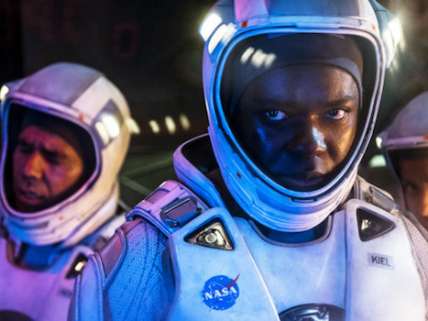Movie Review: The Cloverfield Paradox
Space is not the place for J.J. Abrams' stumbling franchise.

You'll recall that at the end of 10 Cloverfield Lane, the previous entry in this sorta-franchise, an escaping Mary Elizabeth Winstead was on her way to Houston to…
Well, it doesn't matter what she was on her way to Houston to do, does it? Because in the same way that Lane had only the most tenuous connection to the 2008 Cloverfield, which launched this series, the latest installment—The Cloverfield Paradox—is essentially an unrelated story, based on a vagabond script that had been bouncing around for a while before being acquired by producer J.J. Abrams, who retrofitted it into his hazily conceived Cloverfield universe.
Apparently Abrams thought a brief shot of a ravening beastie tacked onto the end of the picture (sorry, spoiler-phobes) would be enough to make the Cloverfield connection. I think not, and apparently neither did Paramount Pictures, which decided to dump this long-gestating baby onto Netflix in exchange for a reported $50-million. This allowed the studio to save the untold bushels of money it would have had to spend on a theatrical release. It also enabled Netflix to score some high-profile publicity by airing the movie's first and only trailer during last Sunday's Super Bowl broadcast, and then releasing the whole movie online right after the game. So everybody's pretty happy, I guess. Except for those who've gotten suckered into watching this limp flick.
"Cloverfield," in this iteration, is the name of a space station orbiting high above the Earth. Down below, a worldwide energy shortage has set the community of nations at each other's throats. (The nature of the crisis isn't entirely clear; at least it's not global warming.) The only hope for humankind is a group of seven scientists onboard the space station (they're played by the over-qualified Gugu Mbatha-Raw, Daniel Brühl, David Oyelowo, and Zhang Ziyi, among others). These hotshots are charged with revving up a big particle accelerator that—once it gets going—will bring peace to the world by providing an endless stream of free energy, forever.
As if. In a TV transmission from Earth, we see a very worked-up talking head (Donal Logue) warning that there'll be a price to pay for "ripping open the membrane of space-time" and unleashing "chaos the likes of which we have never seen—monsters, demons, beasts from the sea." When he puts it that way, it does sound bad.
Logue's puffed-up pontificator is one of the hand-me-downs from the low-budget sci-fi films of the 1950s that have been such a charming part of the Cloverfield movies. Until now, Abrams and his various directors (here, Julius Onah) were doing an enjoyable job of rehabilitating this disreputable genre for a new era. But the fun has petered out. The Paradox plot has been too awkwardly repurposed for the Cloverfield universe—the focus-grouped seams are everywhere apparent. The abundant borrowings from earlier sci-fi pics—from 2001 to Alien to Sunshine—are a constant reminder that the filmmakers have come up with nothing new of their own. And the movie has its own energy problem: it's such a dull exercise, you become ever more aware of how much it drags.
The story? There's an arm-chewing spaceship bulkhead, and a matching chewed-off arm that wants a pen and paper. There's a Russian guy who's filled with worms, and an eerie blonde (Elizabeth Debicki) who turns out to be a traveler from another dimension. There's also a space fistfight, a space chick fight, and one crew member who announces—unnecessarily, you'd think— "I'm a physicist." Says another: "This dimension is eating us alive." Says yet another: "Logic doesn't apply to any of this." Unfortunately, that's the least of this movie's problems.


Show Comments (34)